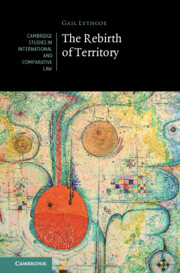Book contents
- The Rebirth of Territory
- Cambridge Studies in International and Comparative Law: 186
- The Rebirth of Territory
- Copyright page
- Contents
- Acknowledgements
- Table of Cases
- Table of Treaties, Resolutions, and Acts of International Organisations
- Abbreviations
- 1 Introduction
- 2 Deterritorialisation Discourse in International Law
- 3 Excavating the Territory of International Law
- 4 Re-imagining the Concept of Territory
- 5 Reterritorialising International Law
- 6 A New Legal Geography for International Law
- Bibliography
- Index
- Cambridge Studies in International and Comparative Law
1 - Introduction
Published online by Cambridge University Press: 07 March 2024
- The Rebirth of Territory
- Cambridge Studies in International and Comparative Law: 186
- The Rebirth of Territory
- Copyright page
- Contents
- Acknowledgements
- Table of Cases
- Table of Treaties, Resolutions, and Acts of International Organisations
- Abbreviations
- 1 Introduction
- 2 Deterritorialisation Discourse in International Law
- 3 Excavating the Territory of International Law
- 4 Re-imagining the Concept of Territory
- 5 Reterritorialising International Law
- 6 A New Legal Geography for International Law
- Bibliography
- Index
- Cambridge Studies in International and Comparative Law
Summary
The introductory chapter outlines the need for a rethink of territory. Beneath the surface of international and transnational discourses about globalisation and global governance is a conceptual and theoretical indeterminacy deriving from the, often unperceived, conflicting nature of the spaces of globalisation and the spaces of sovereignty. Where global law and governance are discussed, the old statocentric conceptions of spatiality provide the governing model, dominating such that if there is no state-territory, it is asumed there is no territory at all. There is tension between theories of a system with an overly determined spatial logic to ones without much account of space. There is little discussion about where functions go nor of the logics of the spaces in which they are exercised. The spaces of reterritorialisation are missing. As a result, functions exercised ‘beyond’ state territories appear to ‘float free’ of the highly specific territorialised legal order. Many theories cannot account for reterritorialisation because the territories of non-state actors are invisible to international legal thought because its orthodox spatial imaginary only makes visible state spaces.
Keywords
- Type
- Chapter
- Information
- The Rebirth of Territory , pp. 1 - 29Publisher: Cambridge University PressPrint publication year: 2024

